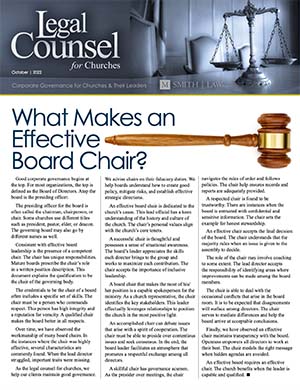Recently, we have received a spate of calls from potential clients dealing with internal quarrels. In most of these instances, church members are fighting one another over control of the church’s assets, ministries, and practices. The issues include spiritual and secular disagreements. These cases are often emotional, complicated, and expensive for the clients.
When church disputes wind up in court, lines are drawn, lawyers file competing motions, and the public peers into family business. This is a stressful time for everyone.
The best solution to a church dispute is to avoid conditions where a fight could arise in the first place. This avoidance is accomplished with effective corporate governance. To press this point, here are some of the most common governance mishaps we see. These problems can lead to internal squabbles at churches.
1. Dueling Bylaws: This is when multiple versions of the church bylaws are circulated as authentic. This may come about when changes are made by a few officials without the full participation of the church body.
2. Improper Official Actions: Directors create chaos when they violate their own rules of order. The efficacy of a meeting is questioned when there was a lack of sufficient notice or the establishment of a quorum. The resulting decisions are often controversial and confusing to stakeholders.
3. Conflicts of Interest: Church officials who fail to put the ministry first violate their fiduciary duty. Nothing should come before the interests of the church. Personal gains should be put on the back burner. Conflicts of interest often generate distrust and wariness.
4. Right to Inspection: Suspicions arise when church members are denied their right to receive church records and financial reports. Unless the bylaws state otherwise, NC law gives members a right to know certain information about their church.
5. Conversion: This happens when church officials take church property for personal use with no intention of returning the assets. This infraction can lead to civil and/or criminal claims against the church officers.
There are often no clear winners or losers in an internal church squabble that escalates into a lawsuit. The situation quickly gets personal. Friendships are broken. Some members leave the church. Those who remain report a sense of loss.
We advise our clients to get their governance houses in order before a controversy appears. When no debate is at hand, we find church officials are more cooperative and trusting of each other. Here’s a few tips on improving church corporate governance.
1. Keep Up-To-Date Bylaws: Over time, bylaws can lose their relevance as church procedures evolve. North Carolina and Federals changes in the law may render some bylaws terms outdated. Churches should review their bylaws periodically. An attorney review will help ensure the most current laws are incorporated in the bylaws.
2. Hold Regular Church Meetings: An empowered and informed membership improves overall governance. Open participation garners trust and compliance. Members feel buy-in when their voices are heard. Members respect their leaders when there is transparency in all business matters.
3. Ensure Financial Integrity: Churches that employ sound fiscal systems are more resilient. These practices include dual controls over the finances, internal reviews, checks/balances, and regular reporting to the membership.
4. Provide Professional Education: An important key to good governance is trained and equipped church officers. All officials, including board members, should undergo annual education sessions to improve their technical and fiduciary skills.
5. Hold Strategic Planning Sessions: High performing churches conduct regular planning exercises. Doing so reduces the risk of internal misalignments that can lead to litigation.
6. Review Contracts Carefully: Before signing on the dotted lines, leaders should seek a legal review. A bad deal could invite a lack of confidence in the leadership.
7. Independent Audit: One way to allay fears of mismanagement is to be transparent. This can be done by having an independent audit each year and sharing the results with all church officials.
Ineffective management and leadership can lead to internal church disputes. Church leaders can evade court involvement altogether with sound practices. Carefully review the corporate governance health of your church. Look for ways to keep your ministry out of court.

